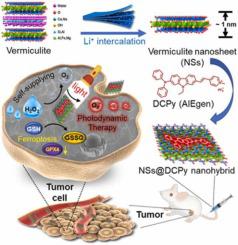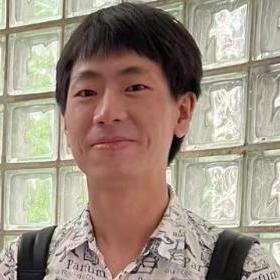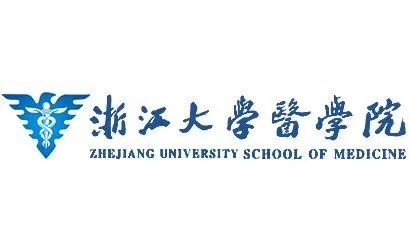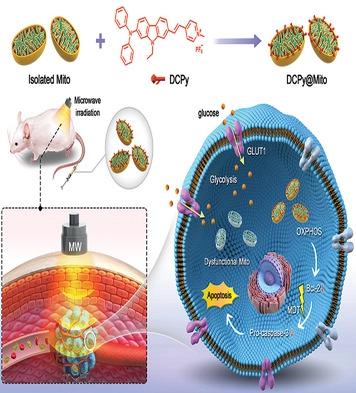The University of Hong Kong
Bonsai-inspired AIE nanohybrid photosensitizer based on vermiculite nanosheets for ferroptosis-assisted oxygen self-sufficient photodynamic cancer therapy
Nano Today ( IF 18.962 ) Pub Date : 2022-03-30 , DOI: 10.1016/j.nantod.2022.101477
Xinghua Yu , Ying-Chuan Zhang , Xing Yang , Ziyang Huang , Tianfu Zhang , Liusi Yang , Wenjing Meng , Xiaotong Liu , Ping Gong , Alessandra Forni , Zheng Zheng , Bilu Liu , Pengfei Zhang , Lintao Cai , Ben Zhong Tang
 |
Oxygen-dependent photodynamic therapy (PDT) for cancer treatment based on aggregation-induced emission luminogen (AIEgen) photosensitizer shows limited efficiency in the hypoxic tumor microenvironment (TME). To overcome tumor hypoxia-induced PDT resistance, a bonsai-inspired oxygen self-sufficient photodynamic cancer therapeutic system was developed based on AIEgen/vermiculite nanohybrid. Ultrathin nanosheets (NSs) were synthesized by lithium-ion intercalation from potting soil vermiculite for AIEgen photosensitizer (DCPy) loading through electrostatic attraction to produce NSs@DCPy (nano bonsai). When NSs@DCPy was absorbed by hypoxic the tumor and exposed to white light radiation, the NSs@DCPy could not only produce 1O2 and·OH but also catalyze the H2O2 to generate O2 for alleviating hypoxia significantly improving PDT efficacy. Surprisingly, NSs@DCPy could induce ferroptosis of the tumor by iron overload and depleting glutathione (GSH). Therefore, we provide a bonsai-inspired AIEgen-vermiculite nanohybrid platform for ferroptosis-assisted oxygen self-sufficient photodynamic cancer therapy.
AIEgens/Mitochondria Nanohybrids as Bioactive Microwave Sensitizers for Non-Thermal Microwave Cancer Therapy
Advanced Healthcare Materials ( IF 11.092 ) Pub Date : 2023-02-17 , DOI: 10.1002/adhm.202202907
Xinghua Yu 1, 2 , Ming Lyu 1 , Xupei Ou 1 , Wenquan Liu 3 , Xing Yang 1, 4 , Xiaoxi Ma 1, 4 , Tianfu Zhang 5 , Longnan Wang 1 , Ying-Chuan Zhang 6 , Sijie Chen 7 , Ryan T K Kwok 5 , Zheng Zheng 3, 4, 8 , Hong-Liang Cui 3, 4 , Lintao Cai 1, 4 , Pengfei Zhang 1, 4 , Ben Zhong Tang 9
Aggregation-induced emission luminogens (AIEgens) are widely used as photosensitizers for image-guided photodynamic therapy (PDT). Due to the limited penetration depth of light in biological tissues, the treatments of deep-seated tumors by visible-light-sensitized aggregation-induced emission (AIE) photosensitizers are severely hampered. Microwave dynamic therapy attracts much attention because microwave irradiation can penetrate very deep tissues and sensitize the photosensitizers to generate reactive oxygen species (ROS). In this work, a mitochondrial-targeting AIEgen (DCPy) is integrated with living mitochondria to form a bioactive AIE nanohybrid. This nanohybrid can not only generate ROS under microwave irradiation to induce apoptosis of deep-seated cancer cells but also reprogram the metabolism pathway of cancer cells through retrieving oxidative phosphorylation (OXPHOS) instead of glycolysis to enhance the efficiency of microwave dynamic therapy. This work demonstrates an effective strategy to integrate synthetic AIEgens and natural living organelles, which would inspire more researchers to develop advanced bioactive nanohybrids for cancer synergistic therapy.



